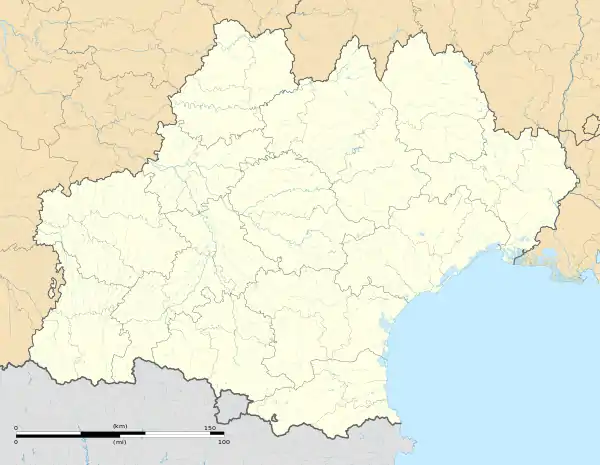Vic-le-Fesq | |
|---|---|
 The town hall of Vic-le-Fesq | |
.svg.png.webp) Coat of arms | |
Location of Vic-le-Fesq | |
 Vic-le-Fesq  Vic-le-Fesq | |
| Coordinates: 43°52′12″N 4°04′59″E / 43.87°N 4.083°E | |
| Country | France |
| Region | Occitania |
| Department | Gard |
| Arrondissement | Le Vigan |
| Canton | Quissac |
| Intercommunality | Piémont Cévenol |
| Government | |
| • Mayor (2020–2026) | José Monel[1] |
| Area 1 | 9.63 km2 (3.72 sq mi) |
| Population | 571 |
| • Density | 59/km2 (150/sq mi) |
| Time zone | UTC+01:00 (CET) |
| • Summer (DST) | UTC+02:00 (CEST) |
| INSEE/Postal code | 30349 /30260 |
| Elevation | 35–163 m (115–535 ft) (avg. 58 m or 190 ft) |
| 1 French Land Register data, which excludes lakes, ponds, glaciers > 1 km2 (0.386 sq mi or 247 acres) and river estuaries. | |
Vic-le-Fesq (French pronunciation: [vik lə fɛsk]; Occitan: Vic e lo Fesc) is a commune in the Gard department in southern France.
Geography
Climate
Vic-le-Fesq has a hot-summer Mediterranean climate (Köppen climate classification Csa). The average annual temperature in Vic-le-Fesq is 14.2 °C (57.6 °F). The average annual rainfall is 844.7 mm (33.26 in) with September as the wettest month. The temperatures are highest on average in July, at around 23.4 °C (74.1 °F), and lowest in January, at around 6.2 °C (43.2 °F). The highest temperature ever recorded in Vic-le-Fesq was 43.3 °C (109.9 °F) on 28 June 2019; the coldest temperature ever recorded was −16.0 °C (3.2 °F) on 15 January 1985.
| Climate data for Vic-le-Fesq (1991−2020 normals, extremes 1966−present) | |||||||||||||
|---|---|---|---|---|---|---|---|---|---|---|---|---|---|
| Month | Jan | Feb | Mar | Apr | May | Jun | Jul | Aug | Sep | Oct | Nov | Dec | Year |
| Record high °C (°F) | 22.2 (72.0) |
24.4 (75.9) |
28.5 (83.3) |
31.7 (89.1) |
34.3 (93.7) |
43.3 (109.9) |
39.9 (103.8) |
40.8 (105.4) |
36.1 (97.0) |
32.7 (90.9) |
26.4 (79.5) |
21.0 (69.8) |
43.3 (109.9) |
| Mean daily maximum °C (°F) | 11.8 (53.2) |
13.3 (55.9) |
17.0 (62.6) |
19.6 (67.3) |
23.8 (74.8) |
28.5 (83.3) |
31.5 (88.7) |
31.1 (88.0) |
26.2 (79.2) |
20.9 (69.6) |
15.5 (59.9) |
12.2 (54.0) |
20.9 (69.6) |
| Daily mean °C (°F) | 6.2 (43.2) |
6.8 (44.2) |
10.0 (50.0) |
12.8 (55.0) |
16.7 (62.1) |
20.8 (69.4) |
23.4 (74.1) |
23.2 (73.8) |
18.9 (66.0) |
15.0 (59.0) |
10.1 (50.2) |
6.8 (44.2) |
14.2 (57.6) |
| Mean daily minimum °C (°F) | 0.5 (32.9) |
0.3 (32.5) |
3.0 (37.4) |
5.9 (42.6) |
9.6 (49.3) |
13.1 (55.6) |
15.3 (59.5) |
15.2 (59.4) |
11.6 (52.9) |
9.2 (48.6) |
4.6 (40.3) |
1.3 (34.3) |
7.5 (45.5) |
| Record low °C (°F) | −16.0 (3.2) |
−12.1 (10.2) |
−12.1 (10.2) |
−4.9 (23.2) |
−2.0 (28.4) |
2.5 (36.5) |
5.5 (41.9) |
4.4 (39.9) |
0.0 (32.0) |
−4.2 (24.4) |
−9.3 (15.3) |
−10.4 (13.3) |
−16.0 (3.2) |
| Average precipitation mm (inches) | 67.5 (2.66) |
47.1 (1.85) |
52.7 (2.07) |
71.5 (2.81) |
61.7 (2.43) |
48.3 (1.90) |
27.1 (1.07) |
46.6 (1.83) |
126.6 (4.98) |
116.5 (4.59) |
108.9 (4.29) |
70.2 (2.76) |
844.7 (33.26) |
| Average precipitation days (≥ 1.0 mm) | 6.6 | 4.9 | 5.1 | 6.8 | 6.4 | 5.0 | 3.2 | 4.6 | 5.5 | 7.2 | 7.8 | 6.3 | 69.5 |
| Source: Météo-France[3] | |||||||||||||
Population
| Year | Pop. | ±% |
|---|---|---|
| 1962 | 178 | — |
| 1968 | 1,999 | +1023.0% |
| 1975 | 231 | −88.4% |
| 1982 | 209 | −9.5% |
| 1990 | 250 | +19.6% |
| 1999 | 295 | +18.0% |
| 2008 | 375 | +27.1% |
See also
References
- ↑ "Répertoire national des élus: les maires" (in French). data.gouv.fr, Plateforme ouverte des données publiques françaises. 13 September 2022.
- ↑ "Populations légales 2021". The National Institute of Statistics and Economic Studies. 28 December 2023.
- ↑ "Fiche Climatologique Statistiques 1991-2020 et records" (PDF) (in French). Météo-France. Retrieved 4 September 2022.
Wikimedia Commons has media related to Vic-le-Fesq.
This article is issued from Wikipedia. The text is licensed under Creative Commons - Attribution - Sharealike. Additional terms may apply for the media files.